Attending were: members of the Law and Justice Committee; representatives of the Supreme People's Court, the Supreme People's Procuracy ; representatives of the Standing Committee of the Ethnic Council and a number of agencies of the National Assembly; representatives of leaders of relevant ministries and branches...
Speaking at the opening of the meeting, Chairman of the Committee on Law and Justice Hoang Thanh Tung stated that the time from now until the opening of the Ninth Session is very short while the workload is very large.
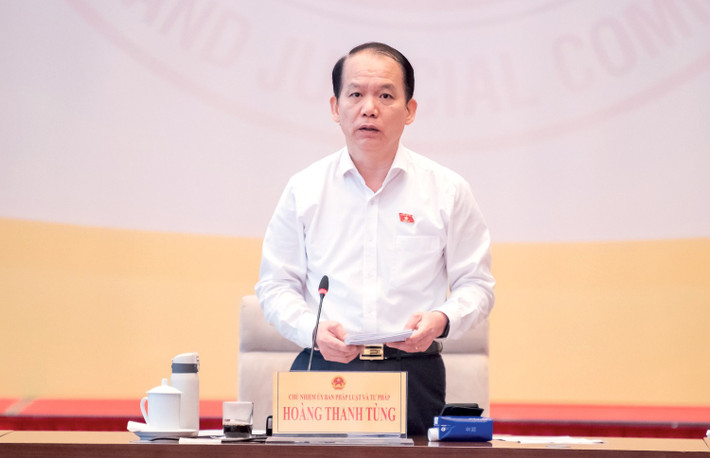
According to the meeting agenda, the Committee on Law and Justice is responsible for presiding over 27 contents including: amending and supplementing a number of articles of the Constitution; 21 draft laws and draft resolutions under the authority of the National Assembly ; 5 draft ordinances under the authority of the National Assembly Standing Committee. Among them, there are very important major contents such as: amending and supplementing a number of articles of the Constitution; amending the Penal Code, the Law on Organization of Criminal Investigation Agencies, the Law on Inspection, etc. Thus, the requirement is to be very urgent, but at the same time it is also necessary to ensure the high quality of the draft laws and resolutions.
Noting that the time to prepare documents for draft laws and resolutions is very urgent, the Chairman of the Committee on Law and Justice stated that at this time, the agencies of the National Assembly, including the Committee on Law and Justice, have received many documents for draft laws and resolutions at the same time. Currently, the Committee has examined 5 contents (except for the content of amending the Constitution), and there are 21 contents to be examined from now until the 9th Session. Therefore, at the second plenary session taking place over 2 and a half days (April 23-25), the Committee is expected to examine 13 draft laws and resolutions.
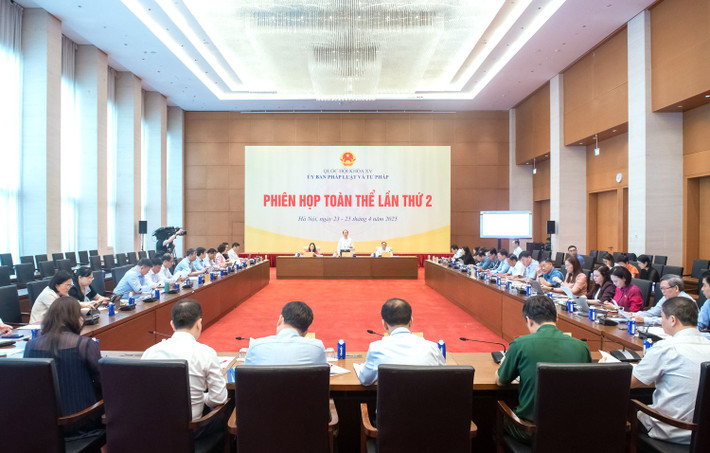
At this morning's meeting, the Committee on Law and Justice examined the draft Law amending and supplementing a number of articles of the Law on Organization of People's Courts; the draft Law amending and supplementing a number of articles of the Law on Organization of People's Procuracies; the draft Law amending and supplementing a number of articles of the Civil Procedure Code, the Administrative Procedure Law, the Juvenile Justice Law, the Bankruptcy Law and the Law on Mediation and Dialogue at Court.
According to the Draft Law on Amending and Supplementing a Number of Articles of the Law on Organization of People's Courts, the draft Law consists of 4 articles, amending and supplementing regulations on the organization of the Court system in the direction of not organizing the High People's Court, District People's Court; establishing Regional People's Courts; converting specialized First Instance People's Courts into specialized Courts in the Regional People's Courts. Accordingly, the model of the organization of the Court system includes: the Supreme People's Court; People's Courts of provinces and centrally-run cities; Regional People's Courts.
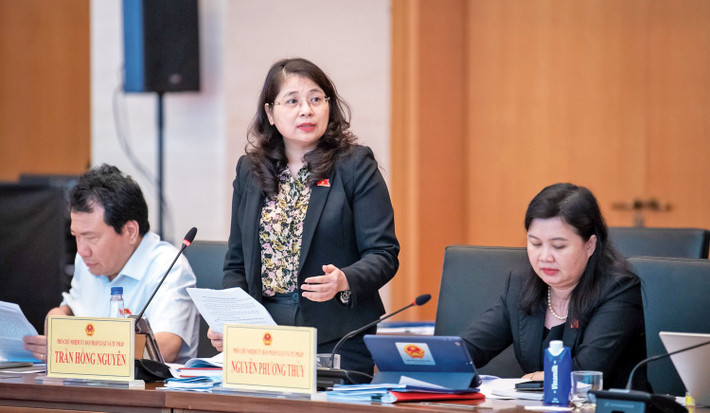
The Draft Law stipulates increasing the number of Supreme People's Court judges from 13 to 17 to 23 to 27; amending and supplementing regulations on the organizational structure of regional People's Courts by adding regulations to some regional People's Courts to establish Bankruptcy Courts and Intellectual Property Courts; the territorial jurisdiction of these specialized Courts is prescribed by the National Assembly Standing Committee.
Examining the draft Law, the Committee on Law and Justice approved the amendments and supplements to the Law on Organization of People's Courts as well as the scope of amendments and supplements and the layout of the draft Law.
There are suggestions that the provincial People's Court that is handling a case or matter, but has not yet completed the resolution by the effective date of the Law, must transfer the files and documents to the regional court for immediate implementation of the new authority; creating favorable conditions for local people to exercise their procedural rights and obligations. At the same time, it is necessary to provide transitional regulations to simplify the procedures for transferring procedural files.
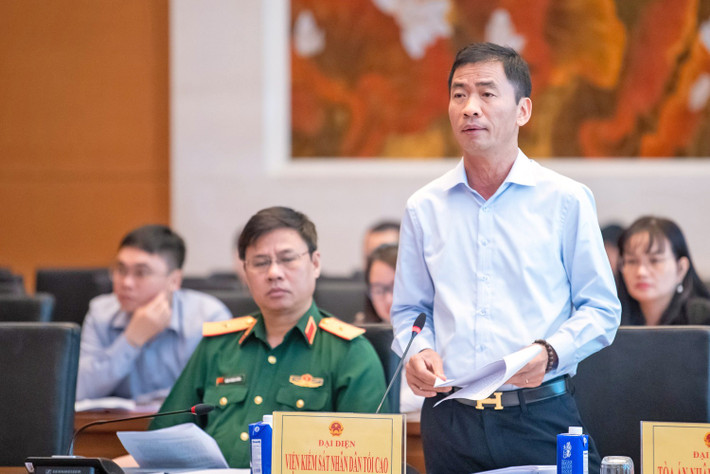
Delegates also requested the drafting agency to carefully study and seek opinions from competent authorities on the establishment of Bankruptcy Courts and Intellectual Property Courts at some regional People's Courts; and increasing the number of Supreme People's Court Judges.
+ According to the Draft Law on amending and supplementing a number of articles of the Law on Organization of the People's Procuracy, the development of the Law aims to perfect the legal basis for the organization of the People's Procuracy to ensure conformity with the arrangement and streamlining of the apparatus into 3 levels: the Supreme People's Procuracy, the Provincial People's Procuracy, and the Regional People's Procuracy according to the Party's policy.
The draft Law amends and supplements Clause 1, Article 93 in the direction of increasing the maximum number of Supreme People's Procuracy Prosecutors from 19 to 27 to ensure human resources to perform the tasks of prosecution and trial supervision of the activities of the Supreme People's Court's Judicial Council.
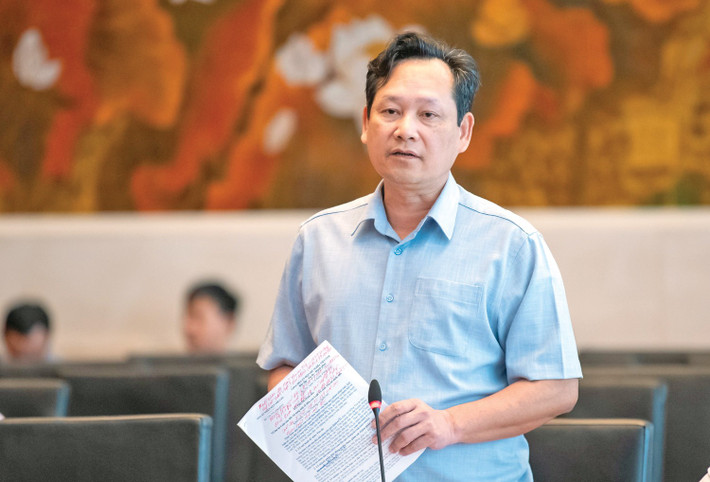
The opinions of the Committee on Law and Justice found that the draft Law closely followed the Party's resolutions and conclusions on streamlining the People's Procuracy apparatus.
Regarding the duties and powers of the Regional People's Procuracy, the draft Law stipulates that this level of procuracy exercises the right to prosecute and supervise judicial activities within the assigned area, but it is unclear which level or entity assigns the scope of operation of the Regional People's Procuracy. Therefore, it is proposed to clearly stipulate the authority to determine the area of operation for the Regional People's Procuracy to avoid legal gaps.
+ Next, the Law and Justice Committee examined the draft Law amending and supplementing a number of articles of the Civil Procedure Code, the Administrative Procedure Law, the Juvenile Justice Law, the Bankruptcy Law and the Law on Mediation and Dialogue at Court.
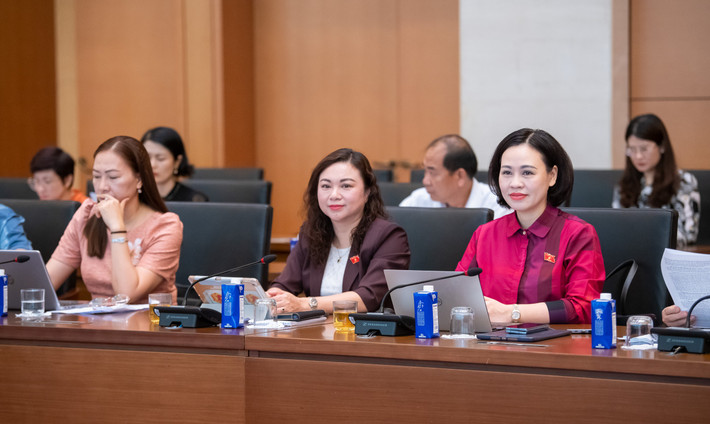
Delegates attending the meeting
Based on the model of organizing the 3-level People's Court, the draft Law amends and supplements the provisions on the jurisdiction of the Regional People's Court, the Provincial People's Court, and the Supreme People's Court. According to the draft Law, the Provincial People's Court no longer has the jurisdiction to resolve administrative cases and civil cases at first instance; resolve bankruptcy; organize mediation and dialogue activities. At the same time, the jurisdiction of the Regional People's Court is adjusted to increase in the direction that the Regional People's Court has the jurisdiction to resolve all civil cases and administrative cases at first instance; resolve bankruptcy; organize mediation and dialogue activities according to the provisions of the Law on Mediation and Dialogue at Court.
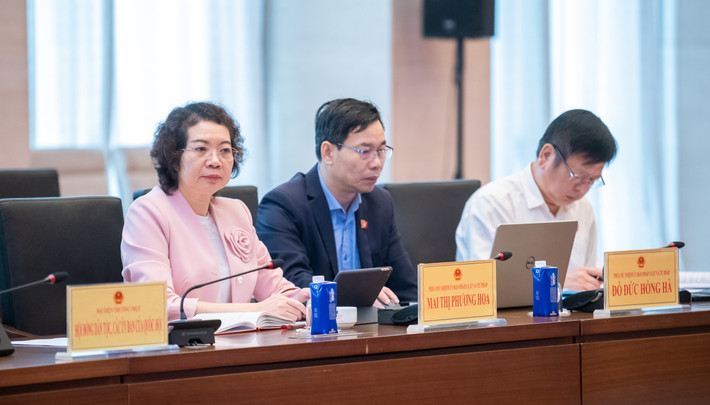
Delegates attending the meeting
The Committee on Law and Justice agrees with the necessity of developing a draft Law. However, the number of cases of review and retrial that the Council of Judges of the Supreme People's Court will have to handle in the coming time is expected to be quite large, so it is recommended that the Supreme People's Court continue to have solutions to improve the quality of first-instance and appeal trials to limit requests for review and retrial; improve the capacity and qualifications of court officials and civil servants, especially judges; transfer a number of judges from the High People's Court to work at the Supreme People's Court; increase the application of information technology in court work... so that the Council of Judges of the Supreme People's Court can effectively perform the assigned tasks of review and retrial.
Source: https://daibieunhandan.vn/uy-ban-phap-luat-va-tu-phap-hop-phien-toan-the-thu-hai-post411147.html


![[Photo] More than 17,000 candidates participate in the 2025 SPT Competency Assessment Test of Hanoi National University of Education](https://vphoto.vietnam.vn/thumb/1200x675/vietnam/resource/IMAGE/2025/5/17/e538d9a1636c407cbb211b314e6303fd)
![[Photo] Readers line up to visit the photo exhibition and receive a special publication commemorating the 135th birthday of President Ho Chi Minh at Nhan Dan Newspaper](https://vphoto.vietnam.vn/thumb/1200x675/vietnam/resource/IMAGE/2025/5/17/85b3197fc6bd43e6a9ee4db15101005b)
![[Photo] Prime Minister Pham Minh Chinh chairs meeting on science and technology development](https://vphoto.vietnam.vn/thumb/1200x675/vietnam/resource/IMAGE/2025/5/17/ae80dd74c384439789b12013c738a045)






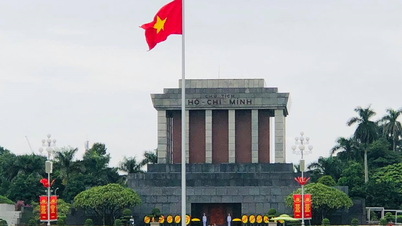















![[Photo] Nearly 3,000 students moved by stories about soldiers](https://vphoto.vietnam.vn/thumb/1200x675/vietnam/resource/IMAGE/2025/5/17/21da57c8241e42438b423eaa37215e0e)






































































Comment (0)